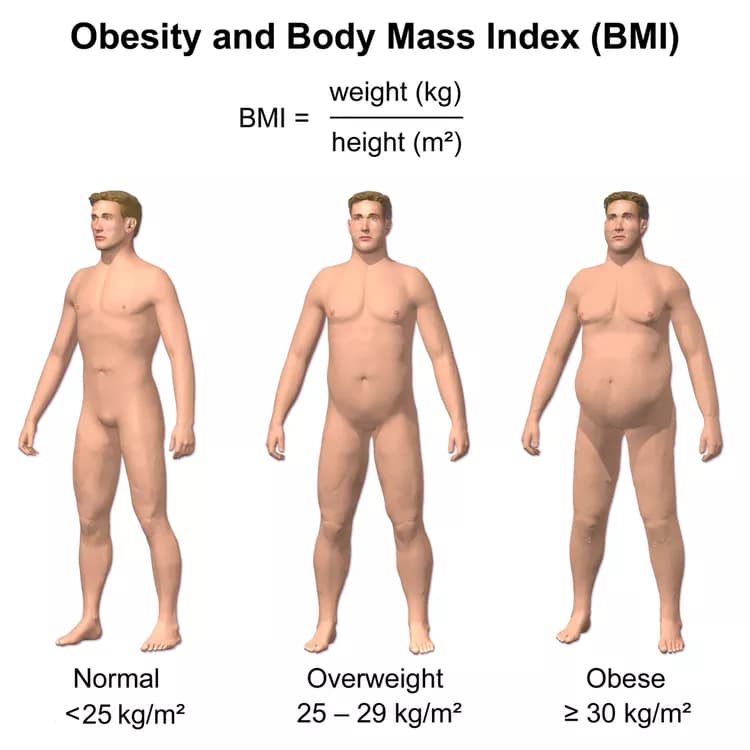
Obesity Increases Dementia Risk
People who have a high body mass index (BMI) are more likely to develop dementia than those with a normal weight, according to a new UCL-led study.
The study, published in the Alzheimer's & Dementia journal, analysed data from 1.3 million adults living in the United States and Europe. The researchers also found that people near dementia onset, who then go on to develop dementia, tend to have lower body weight than their dementia-free counterparts.
"The BMI-dementia association observed in longitudinal population studies, such as ours, is actually attributable to two processes," said lead author of the study, Professor Mika Kivimäki (UCL Institute of Epidemiology & Health). "One is an adverse effect of excess body fat on dementia risk. The other is weight loss due to pre-clinical dementia. For this reason, people who develop dementia may have a higher-than-average body mass index some 20 years before dementia onset, but close to overt dementia have a lower BMI than those who remain healthy."
"The new study confirms both the adverse effect of obesity as well as weight loss caused by metabolic changes during the pre-dementia stage."
Past research on how a person's weight influences their risk of dementia has produced conflicting results. Some findings have suggested that being obese poses a higher dementia risk, but other studies have linked lower weight to increased dementia incidence.
In this study, researchers from across Europe pooled individual-level data from 39 longitudinal population studies from the United States, the United Kingdom, France, Sweden, and Finland. A total of 1,349,857 dementia-free adults participated in these studies and their weight and height were assessed. Dementia was ascertained using linkage to electronic health records obtained from hospitalisation, prescribed medication and death registries.
A total of 6,894 participants developed dementia during up to 38 years of follow-up. Two decades before symptomatic dementia, higher BMI predicted dementia occurrence: each 5-unit increase in BMI was associated with a 16-33% higher risk of this condition (5 BMI units is 14.5kg for a person 5'7" (170cm) tall, approximately the difference in weight between the overweight and normal weight categories or between the obese and overweight categories). In contrast, the mean level of BMI during pre-clinical stage close to dementia onset was lower compared to that in participants who remained healthy.
In 2015, the number of people with dementia reached almost 45 million, two times more than in 1990. This study suggests that maintaining a healthy weight could prevent, or at least delay, dementia.
Materials provided by University College London. Note: Content may be edited for style and length.
Disclaimer: DoveMed is not responsible for the accuracy of the adapted version of news releases posted to DoveMed by contributing universities and institutions.
References:
Mika Kivimäki, Ritva Luukkonen, G. David Batty, Jane E. Ferrie, Jaana Pentti, Solja T. Nyberg, Martin J. Shipley, Lars Alfredsson, Eleonor I. Fransson, Marcel Goldberg, Anders Knutsson, Markku Koskenvuo, Eeva Kuosma, Maria Nordin, Sakari B. Suominen, Töres Theorell, Eero Vuoksimaa, Peter Westerholm, Hugo Westerlund, Marie Zins, Miia Kivipelto, Jussi Vahtera, Jaakko Kaprio, Archana Singh-Manoux, Markus Jokela. (2017). Body mass index and risk of dementia: Analysis of individual-level data from 1.3 million individuals. Alzheimer's & Dementia. DOI: 10.1016/j.jalz.2017.09.016
Related Articles
Test Your Knowledge
Asked by users
Related Centers
Related Specialties
Related Physicians
Related Procedures
Related Resources
Join DoveHubs
and connect with fellow professionals

0 Comments
Please log in to post a comment.